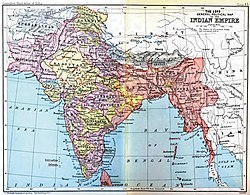Indian independence movement

Imperial entities of India
|
|
| Dutch India | 1605–1825 |
|---|---|
| Danish India | 1620–1869 |
| French India | 1769–1954 |
|
|
|
| Casa da Índia | 1434–1833 |
| Portuguese East India Company | 1628–1633 |
|
|
|
| East India Company | 1612–1757 |
| Company rule in India | 1757–1858 |
| British Raj | 1858–1947 |
| British rule in Burma | 1824–1948 |
| Princely states | 1721–1949 |
| Partition of India |
1947
|
|
|
|
The Indian independence movement encompassed activities and ideas aiming to end the East India Company rule (1757–1858) and the British Indian Empire (1858–1947) in the Indian subcontinent. The movement spanned a total of 190 years (1757-1947).
The very first organised militant movements were in Bengal, but they later took movement in the then newly formed Indian National Congress with prominent moderate leaders seeking only their basic right to appear for Indian Civil Service examinations, as well as more rights, economic in nature, for the people of the soil. The early part of the 20th century saw a more radical approach towards political self-rule proposed by leaders such as the Lal, Bal, Pal and Aurobindo Ghosh, V. O. Chidambaram Pillai. The last stages of the self-rule struggle from the 1920s onwards saw Congress adopt Mohandas Karamchand Gandhi's policy of nonviolence and civil resistance, Muhammad Ali Jinnah's constitutional struggle for the rights of minorities in India, and several other campaigns. Activists Netaji Subhash Chandra Bose, Bhagat Singh and Vinayak Damodar Sawarkar preached armed revolution to achieve self-rule. Poets and writers such as Rabindranath Tagore, Subramaniya Bharathi, Allama Iqbal, Josh Malihabadi, Mohammad Ali Jouhar, Bankim Chandra Chattopadhyay and Kazi Nazrul Islam used literature, poetry and speech as a tool for political awareness. Feminists such as Sarojini Naidu and Begum Rokeya promoted the emancipation of Indian women and their participation in national politics. Babasaheb Ambedkar championed the cause of the disadvantaged sections of Indian society within the larger self-rule movement. The period of the Second World War saw the peak of the campaigns by the Quit India Movement led by Mahatma Gandhi and the Indian National Army movement led by Netaji Subhas Chandra Bose.
...
Wikipedia
